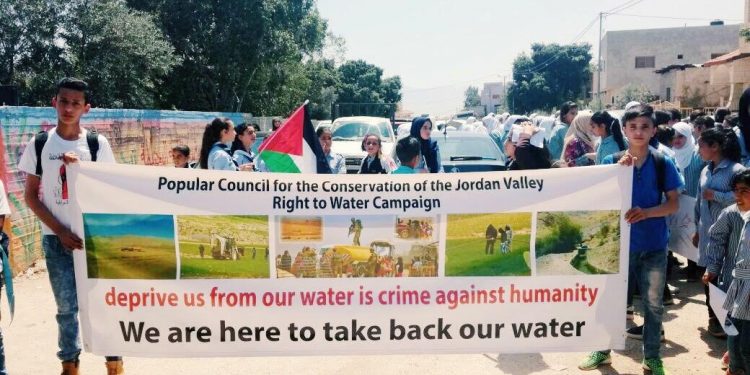Agencies-Gaza post
Israel’s “water-apartheid” approach in the occupied Palestinian territories encourages gross and systematic denial of Palestinians’ rights to adequate water, said the human rights association, Al-Haq, marking World Water Day.
“In Palestine, a region rich in groundwater, Israel’s discriminatory water policies have led to water shortages in Palestinian towns and villages, no access to running water in rural communities, and waterborne diseases as a major cause of death in Gaza,” Al-Haq in a statement reported.
“Israel illegally appropriates Palestinian land, pillaging Palestinian water, and then discriminately allocates water supplies to its citizens and to illegal Israeli settlements at the expense of Palestinians, who own and are entitled to access these water resources. As a result, Israel’s ‘water-apartheid’ facilitates gross and systematic denial of Palestinians’ rights to adequate water, institutionalizing a regime of racial domination and oppression over the Palestinian people.”
For Palestinians, access to land with water resources is forbidden. Palestinians in the West Bank rely on groundwater aids because they are denied entry to surface waters, including the Jordan River.
“Israel ensures its control and disproportionate usage of water resource by preventing Palestinians from accessing their groundwater resources through the issuance of demolition orders for water structures, even on private Palestinian land. Often, the demolition of water structures is conducted by bulldozers from international companies, such as Volvo, Caterpillar Inc, Daio, JCB, LiuGong, Hyundai, and Hidromek,” the rights organization said.
“Corporations increasingly enable this appropriation by sustaining the ongoing dispossession of the already restricted water access to Palestinian communities. Israel’s parastatal institutions, such as Mekorot, have actively taken part in the pillaging of water from the Occupied Palestinian Territory (OPT), to then sell the stolen back to Palestinians at ever-increasing prices, rendering Palestinians dependent on Israel to meet their water needs. Mekorot’s monopoly over the water network enables the company to operate a system of segregation over the Palestinian population while providing a pipeline of running water to the illegal Israeli settlements in the OPT and inside the Green Line. The company holds complete discretion over the water supply to Palestinians through Mekorot-controlled water meters. Simply put, Palestinians are forced to buy over half of the water they consume.”
Al-Haq said companies have a responsibility to appreciate the rights of individuals and communities to water and other natural aids. In conflict-affected areas, this needs corporations to practice improvement due to persistence in understanding their impact on and ensuring compliance with human rights. A company that benefits from the options or environment produced by human rights offenses, even indirectly, may be found complicit in those violations. Specifically, companies working in situations of occupation, risk being held liable for violations of international law and must ensure that their engagements with state authorities do not motivate or facilitate the state’s unlawful practices.
The ‘home states’ (third-party states) of these transnational corporations must also admire human rights concerning their operations abroad. Especially in the context of annexation and war crimes, third-party states must exercise adequate oversight of business operations to prevent adverse human rights impacts caused by their operations abroad, as well as abstaining from aiding or helping in keeping such a situation. Israel’s violation of international law entails the obligation of third-party States to refrain from supporting Israel’s illegal rules, procedures, and measures in the OPT, including that of its illegal settlement enterprise and the funding of Palestinian natural resources, it added.

















